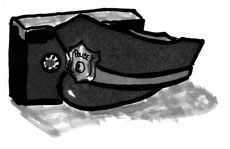Staff editorial: Poor speech

Online Poster
Dec 8, 2004
Last updated on May 11, 2016 at 05:42 p.m.
In the past, the Supreme Court has upheld the speech of flag-burners, white supremacist groups and child pornographers. On Monday, however, it struck down the speech of a former San Diego police officer who was fired for selling sexually explicit videotapes of himself on eBay. Although free speech advocates believe the recent ruling makes it harder for government workers to prove that their speech is protected, we find ourselves siding with the high court’s decision.
The police officer, known as “John Roe” in court documents to protect his identity, advertised himself on eBay as being a law enforcement agent. Although he did not specifically use his San Diego police uniform in the videos, he did wear a similar police uniform and also sold various pieces of San Diego police memorabilia.
One of the videos depicted Roe stripping off a police uniform and then masturbating. While Roe’s activity was done in private, and he did not identify himself as an employee of the San Diego police department, his employers were right to fire him. The nature of his online activities was closely associated with his career as a police officer. According to the court: “the debased parody … brought the mission of the employer and the professionalism of its officers into serious disrepute.”
Police officers have a duty and an image to uphold, whether they are in uniform or not. They are seen as a pillar of stability within the community, and it is their duty to instill respect for the uniform.
Get The Daily Illini in your inbox!
Employee speech should be considered separately from individual speech because there is the potential that the speech might negatively reflect on the reputation of the employer. In this case, the sexually explicit videos had the potential to embarrass the police force, thus eroding respect for the organization.
The ruling does not impact workers communicating something of social or political significance. In the past, the Supreme Court has made attempts to balance the limits of employee speech with speech that is deemed a “public concern.” In the end, workers should be allowed to express their opinions on controversial causes or issues. However, in John Roe’s case, his speech was neither social nor political – its primary purpose was profit.
If employees are about to engage in behavior or speech that could be considered questionable, they should make sure to run it by their employers first. They should ask themselves if their behavior could negatively alter the perception of their profession or the organization that employs them.





